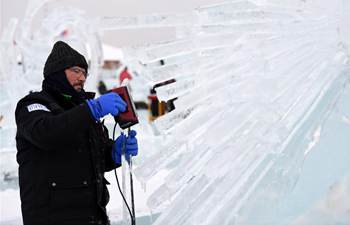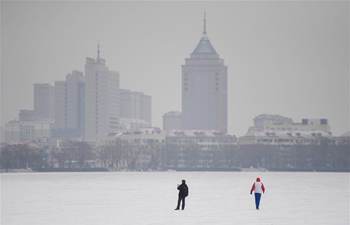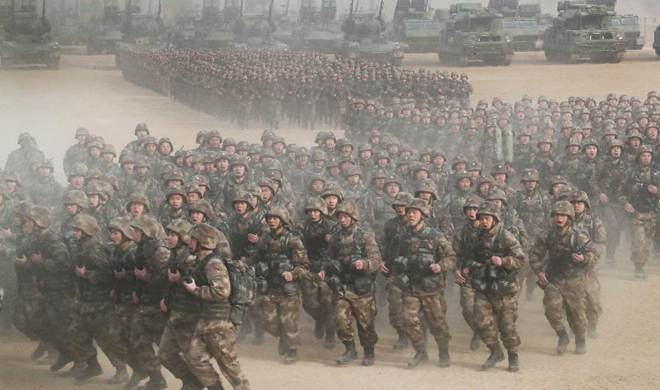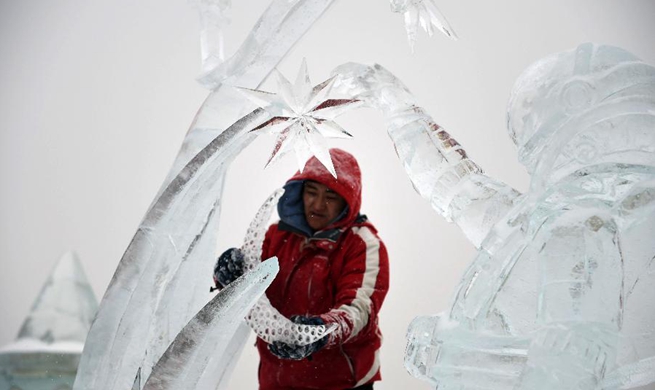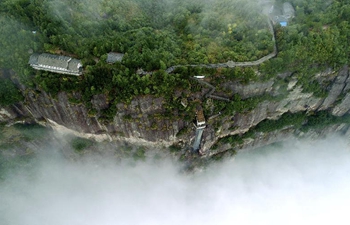TOKYO, Jan. 8 (Xinhua) -- A U.S. military attack helicopter made an emergency landing in Japan's Okinawa Prefecture on Monday, local media reported, with the incident coming on the heels of an almost identical mishap just two days earlier.
The AH-1 attack helicopter belonging to the U.S. Marine Corps Air Station Futenma made the emergency landing at a waste disposal site in the village of Yomitan in Japan's southernmost prefecture.
According to local police and the U.S. military, none of the four crew members aboard were injured in the emergency landing, which took place in the vicinity of a large resort hotel, and there have been no reports of injury to civilians or public property as a result of the latest U.S. military helicopter mishap.
The latest incident involving a U.S. military chopper follows a UH-1 heavy-lift transport helicopter on Saturday making an emergency landing on a sandy beach on Ikei Island, also in Okinawa.
The U.S. Marine Corps said the emergency landing on the small islet was due to "indications of the main rotor moving at too high a speed."
The UH-1 transport helicopter touched down just 100 meters away from a residential house, renewing concerns and anger among locals in Okinawa about the safety of U.S. military hardware owing to the increasing frequency of potentially fatal mishaps and accidents recently.
Both helicopters involved in the incidents are based at the controversial U.S. Marine Corps Air Station Futenma, which is central to a protracted row between the local and central government about its relocation from the densely populated Ginowan district, to the coastal Henoko region also on the island.
Japan's public broadcaster NHK said that according to defense ministry officials, the U.S. side explained to local police investigating the accident Monday that the emergency landing was a result of an instrument in the cockpit indicating there was a fault with the aircraft.
A worker at the waste disposal site was quoted Monday evening as saying he heard a loud noise similar to a "bang" and saw a U.S. military helicopter had abruptly landed on the premises.
Locals from Yomitan village also said they heard an "unusually loud noise" like a bang and could see a helicopter had landed on the grass of the waste disposal site near to the resort hotel.
"I was shocked to see the U.S. attack helicopter had landed so close to my house," one resident living nearby was quoted as telling local media.
"Although the helicopter didn't appear to be damaged or on fire, I was very afraid, particularly as a similar incident took place just two days ago. 'Not again,' I thought to myself."
"While I am angry, I am also afraid and concerned whether the U.S. military is seriously trying to improve its safety standards," the 33-year-old local man said, adding that it might only be a matter of time until one of the helicopters crash-lands onto his house.
His sentiments echo those of most Okinawans, including local officials and assembly members, who are becoming increasingly vexed at the U.S. military for its seemingly lax safety protocols, which have led to a series of helicopter-linked accidents recently.
In December, a resolution demanding all U.S. military flights over schools and hospitals be suspended was unanimously adopted by the Okinawa prefectural assembly.
The move by the prefectural parliament of Okinawa followed a heavy window falling from a U.S. military helicopter the same month and landing on the grounds of an elementary school, narrowly missing scores of children taking a sports class there.
"No more threat to the lives of people in Okinawa should be tolerated," part of the resolution states, with the same message of protest being carried by a number similar resolutions also adopted by municipal assemblies in Okinawa.
The resolution refers to other military-linked accidents in Okinawa, including a CH-53E helicopter crashing and catching fire near the U.S. military's Northern Training Area, just 300 meters away from a residential area in Okinawa in October.
An AH-1 attack helicopter also based at Futenma making an emergency landing last year on a farm path also sparked fear and outrage from locals.
Along with the resolution, a statement of protest was also sent by the assembly to Japanese Prime Minister Shinzo Abe and U.S. Ambassador to Japan William Hagerty highlighting the frequency of U.S. military-linked accidents in Okinawa.
According to the assembly, "A feeling of distrust is mounting among Okinawa people as these incidents vividly illustrate that the U.S. military's measures to prevent similar accidents are not functioning."
The helicopter mishaps, along with other military-linked accidents and crimes committed by U.S.-base-linked personal, spanning from driving under the influence of alcohol, to rape and murder, have contributed to rising unease among locals and increasing anti-U.S. sentiment on the small, sub-tropical island.
Okinawa hosts the bulk of U.S. military bases in Japan yet represents just a tiny fraction of Japan's total land mass.
Locals and officials in Okinawa want to see their decades-long base-hosting burdens lifted by some, if not all, of the U.S. bases being relocated outside the prefecture, or out of Japan entirely.






